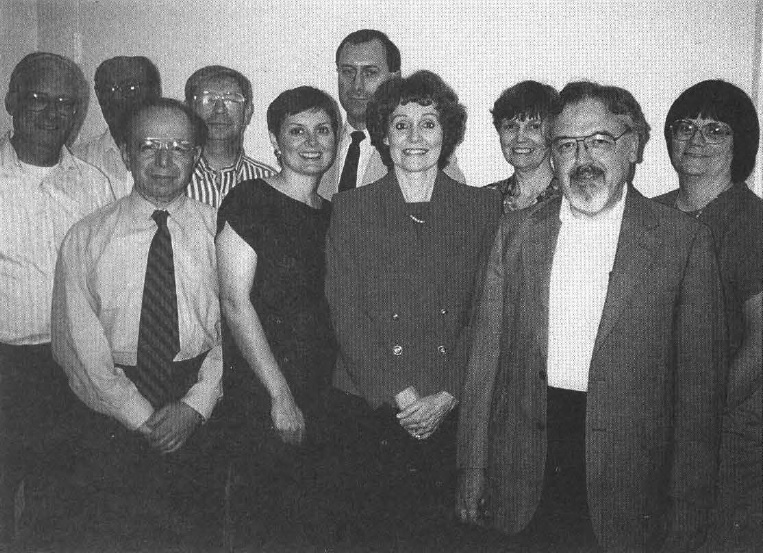FFLA: A History of Giving to Science Education

The 1989 Friends of Fermilab Board of Directors: (l to r) C. Marofske, G. Reed, J. I. Peters, J. Meyer, J. Tollestrup, R. Fieseler, M. Cox, J. Fisk, G. Zahrobsky and M. Bardeen. (Not shown) S. Jovanovic, (president), V. Ball, D. Green, C. Hill, B. Lach, L. Lederman, C. Safanda, D. Schramm, J. Schramm, M. Turner, C. Viola, W. West and C. Woods.
In 1982, a small group of educators, laboratory physicists and energetic volunteers met to discuss ways in which Fermilab's unique intellectual and physical resources could be used to enhance precollege science education. The group developed its first program, a summer institute for science teachers, and aggressively sought funds from the private sector--foundations, corporations and individuals--to underwrite the program. In order to provide the legal framework for receiving private grants, the group drew up articles of incorporation as Friends of Fermilab (FFLA), a not-for-profit membership corporation under the aegis of a volunteer board of directors.
With the enthusiastic support of Leon M. Lederman, then Fermilab director, the young organization grew and prospered. The need was clear - teachers were seeking innovative methods of making science teaching more effective. Their students, from kindergarten through twelfth grade, yearned for science classes that would capture their interest and imagination. FFLA developed programs to meet the demand and teachers and students flocked to Fermilab in ever-increasing numbers. Additional grants from federal and state agencies were garnered to meet FFLA programming needs as programs grew dramatically in both number and scope. Representatives of national laboratories throughout the U.S. visited Fermilab to observe how the partnership between Fermilab and FFLA provided the fertile soil to nurture successful precollege science education.
In the late 1980s, the Department of Energy emphasized the importance of improving precollege science education and acknowledged the federal government's responsibility in this field. At the same time, one of FFLA's earliest goals was being realized with the development on-site of a dedicated education building, the Leon M. Lederman Science Education Center.
In 1989, the Fermilab Education Office was established to provide a central administrative structure for the Lederman Science Center and other science education programs developed through FFLA for the Education Office. Precollege science education was thus formally incorporated into the Laboratory.
Through years of work, FFLA has delivered a thriving precollege science education program to the Laboratory. As a private corporation, FFLA was able to continue to provide services essential to the Laboratory's education mission that the Education Office, by its very nature, could not. These services included both federal grants-seeking and private fundraising as well as liaison to the regional education and business communities. FFLA funds can be used with greater flexibility than Laboratory budgets and FFLA, with oversight from a board of directors, operates with an independence that permits the organization to respond to challenges promptly and effectively. And FFLA' s membership structure gives both the Laboratory and the education community opportunities to be involved with science education.
In 1989, a Memorandum of Understanding (MOU) between Fermilab and FFLA was signed by Director John Peoples and a FFLA board member. The MOU formalized Fermilab's commitment to support FFLA and at the same time secured the FFLA board's commitment to continue to seek funds for programs to be operated by the Fermilab Education Office. The MOU was further defined in 1990 by a Cooperative Educational Agreement between FFLA and Universities Research Association, and this agreement has since been extended until fall 1995.
All members of the Fermilab community are invited to join Friends of Fermilab and contribute toward the continuing success of precollege science education programs. Membership, which is tax-deductible, can be conveniently arranged through payroll deduction. For information on membership events and benefits as well as information on education programs, call Stanka Jovanovic at x3092.
FFLA/Education Office Get High Marks at Review
In order to map out a strategy to maximize its potential as a provider of precollege science education programs, John Peoples invited an external review committee to Fermilab in May 1993 to review the Fermilab Education Office and its programs. The seven-member committee was chaired by Professor Lynn W. Glass of Iowa State University. Its members included four physicists, two biologists and one chemist, all of whom brought a strong and broad background in science and science education to their task. In its report, the Visiting Review Committee gave Fermilab's Education Office high marks. Since precollege science education programs are thriving at Fermilab and the Leon M. Lederman Science Education Center has been such a success, the committee's findings came as no surprise. The committee's praise for Friends of Fermilab (FFLA), however, confirmed the view of those who appreciated the importance of the partnership between FFLA and the Education Office.
FFLA was cited for its historically important role in the inception and development of science education programs. The committee noted FFLA's evolving mutually beneficial partnership with the Education Office and defined a role for the future of FFLA as a resource providing assistance and support to the Education Office. The committee also recognized FFLA's roles as fundraiser, program promoter and link to the business and academic communities. Finally, it counseled representation for FFLA on the advisory board that reports to the director.
The Education Office emerged from the review process with sharper goals and with an increased potential for a continued positive impact on precollege science education. At the same time, by recognizing the crucial role FFLA plays in the success of Fermilab education programs, the review also gave the Fermilab community a greater appreciation of FFLA's continuing importance to Fermilab's mission in precollege science education.


